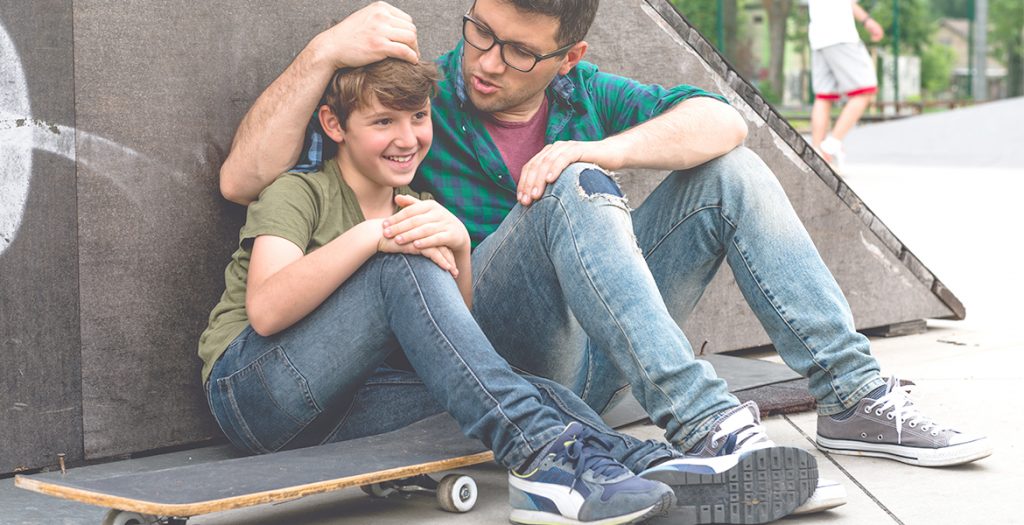I Hate You: A Story on Parenting
“I hate you, dad!” Asher shouted to me in the kitchen, storming out for dramatic effect.
My son was angry. He was having an existential crisis, where he couldn’t make sense of his place in the world, how and when we die, and what it all means. He told my wife and me he wanted to die so he can see what it was like… and then he’d come back. Asher doesn’t understand how this whole life thing works. Neither do I. He’s six. I’m 44.
On this particular day Asher was angry about his lack of freedom. It wasn’t fair that I could do whatever I wanted and he couldn’t, he lamented. He implored me to understand how unfair that was. I explained to him that I understood, but that he was too young to comprehend the consequences of his freedom so until he was older it was my job to help him navigate it. He didn’t feel any better. He told me he hated me.
A friend was over and she asked me why I didn’t punish him for telling me he hated me. “In our house we punish the kids for using the ‘hate’ word. Don’t you?” she asked.
“Does it look like he’s punished?” I clapped back. Yeah, even therapists can be immature. I then self-corrected, and more maturely explained to her that my kids were allowed to hate me. Obviously I didn’t actually think they hated me, but I thought they were angry, and there are times they wanted to do something very badly, and the only person preventing them from doing that thing was me. That’s infuriating for them. I totally get it. If I were them I’d hate me, too.
My wife was out of town for a week, so I was single parenting with the kids. I’m not complaining—these days it’s actually easier for me in some ways. Navigating our different parenting styles is hard for all of us who are co-parenting. One night I asked the kids if they wanted to see a movie. They did. But they couldn’t agree on what to see. It turned into an argument. Asher wanted one movie; my daughter, Sydney, another. They were arguing with each other, and when that didn’t go anywhere they directed it towards me. Sydney, eight, pleaded, “I never get to pick the movie.”
Asher screamed, “It’s not fair!” I tried to get them to find a solution but it wasn’t working.
Frustrated, I asked Asher, “Have you forgotten what it’s like to be a parent?”
“I’ve never been a parent,” he responded, both of us embarrassed by the stupidity of my question.
“What I meant,” I continued, “is can you imagine what it’s like? You each want to see a movie and no matter what decision I make someone will be upset.”
Asher said, “It’s not that hard because you already went to school the most and we haven’t. You’ve been in school so it’s medium hard.” He then went on to explain some system where math would be useful to parenting but I was lost.
“Guys,” I said, “what if I want to see a movie and Sydney wants to see another? What would you do?”
Sydney piped in, “Can I tell you my idea? My idea is we do rock, paper, scissors, shoot.
Asher said, “I don’t agree on that. I agree on dad’s idea.”
“I don’t have an idea,” I said. “Sometimes parents feel stuck. Asher, pretend you’re a dad. It’s up to you. What do we do if I want to see one movie and Sydney wants to see another?”
Asher struggled for a moment, working it out in his brain. And then he seemed to resolve himself to Sydney’s idea. “I’ll just try rock, paper, scissors.”
They did. Sydney won. Asher cried. Then Sydney, as if taking over the role of the parent, gave up her own wants for her little brother. “We can see what you want, Asher. I don’t really like movies that much, anyway.”
I thanked Sydney, and said, “This was not easy, guys.”
Sydney said, “You love us a lot but it’s hard cause when we both want something and it’s different it’s hard for you to decide which one to do.”
“Right,” I responded.
“Definitely right,” she said.
Later that night, I was putting Asher to bed and I talked to him about his feelings. I tried to help him make sense of what was happening with him when he shouts out, “I hate you,” or he throws a toy across the room. He did a good job of expressing himself, and Sydney would fill in any gaps by answering for him from the bottom bunk. If Sydney sees me doing a mediocre job, she will interject a better explanation than I ever could have. I gave Asher a kiss and told him I loved him as I climbed down the ladder to Sydney’s bed. “I love you,” he responded, and I hoped at least some of what I said made sense to him.
I leaned in to the bottom bunk. “I love you, Sydney.”
“I hate you, dad.”
“Thanks, Sydney.”
“It’s opposite day,” she said. And then she gave me a kiss.



